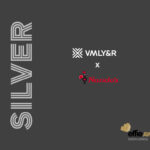 Creativity was, is and will always be ‘good for business’. Long live creative awards, and long live the agencies that enter them.
Creativity was, is and will always be ‘good for business’. Long live creative awards, and long live the agencies that enter them.
This is the opinion of FCB Africa CEO, Brett Morris, who said that it’s hard to think of a way in which creativity is not good for any business, as it is arguably the last true advantage a business has over its competition. Applied correctly, creativity can create exponential value for any brand or business, he argued.
“This is why the advertising industry still needs awards. Given great talent always wants to be challenged, benchmarked and recognised, awards raise the bar on creativity. They are needed, and desired.”
Morris’ comment was promoted by a column on Biz-Community in which Walter Pike, a leading industry practitioner and commentator predicted that creativity will soon become redundant, which of means that creative award shows such as Cannes and Loeries will also become also redundant.
Pike started his argument saying that the age of Big Data, Artificial Intelligence and Programmatic Media is upon us and this ‘Digital Trinity’ will be the key to future brand growth. Big Data gives us more insight into what people need and when they need it. This creates an opportunity for AI content creators to deliver Relevant Advertising that satisfies relevant needs, in the right way; and Programmatic Media that targets specific people at the right time. Marketers that don’t adapt to this new world will become redundant.
His opinion was given weight by the fact that new Publicis Groupe CEO, Arthur Sadun, pulled out of Cannes saying the money would be spent instead on artificial intelligence technology.
“I agree with Pike,” said Morris, “Big Data is revolutionising our industry, and we at FCB Africa are excited by the shift. But, we also believe there are some dangerous fallacies in his conclusions and if we’re not careful, we could follow Pike in throwing the baby out with the bath water.”
 Chief Strategy Officer for FCB Africa, Rita Doherty, takes the argument further, closely examining these assertions made by Pike:
Chief Strategy Officer for FCB Africa, Rita Doherty, takes the argument further, closely examining these assertions made by Pike:
- The Digital Trinity enables us to deliver relevant messages, to the right people, at the right time. Therefore Interruptive Advertising is unnecessary.
- Creativity was necessary for Interruptive Advertising, but it’s not necessary for Relevance Advertising. Therefore creativity is unnecessary.
“The underlying belief seems to be that there will be no more need for provocative advertising that gets attention, because brands will no longer need to sell stuff to uninterested people anymore. Instead brands will be responding to an implicit invitation from a potential consumer,” she said.
“The key to success is therefore a better algorithm to optimise relevance.
“However, just because the ‘Digital Trinity’ optimises Relevance Advertising, it does not follow that Interruptive Advertising becomes redundant. The history of technological innovation suggests the co-existence of both modes of advertising is far more likely. The conclusion that Relevance Advertising makes Interruptive Advertising redundant is therefore unsupported.
“Further, the belief that creativity is not necessary for the success of Relevance Advertising is unproven, and current evidence suggests the opposite – that creativity and relevance together, deliver the best returns.
“In A Case for Creativity by James Hurman, the data clearly shows the annual stock growth of the Cannes Advertiser of the Year, tracked over a period of almost 10 years, was more than 40% higher than the S&P 500 average. The conclusion that creativity will become a weak driver of success is therefore a highly risky bet.
“At FCB Africa, we confidently believe creativity will always optimise returns, regardless of the content delivery system. We embrace Relevance and Creativity; Big Data and Storytelling; AI technology and Creative Awards.”
Doherty’s evidence is based on what marketers know about human behaviour, and specifically buying behaviour.
“Nobel prizewinner Daniel Kahneman argues that most of our decisions are made intuitively based on what satisfies our immediate needs in the easiest possible way. Intuition is an ‘emotional thinking system’ that operates below the level of conscious thinking and directs our behaviour. Most of our buying decisions are made by this intuitive system. What does this mean for marketing?
“Firstly, if most of our buying decisions are made intuitively, then we need to market brands to appeal to the intuitive mind. What does it like? It likes stories.
“Decision-scientists argue that stories are our favourite means of absorbing information about the world because stories humanise information by putting it into context and in a subjective experience. This is why we believe creative storytelling in advertising will never go away – because it is the most effective way to share ideas. The algorithm will not kill the story. The algorithm will deliver stories more effectively, but creativity will never be redundant.
“Second, decision-science argues that most of the information we have about brands is absorbed passively, at low levels of attention. What this means is that we’re continuously absorbing impressions about brands, which over time, build an emotional brand memory that guides our choices.
“Interruptive Advertising, which sends people messages when they are not looking for them, is very effective because if feeds brand memories. Contrary to popular belief, passive media is a good thing because it means very little is demanded from the audience.
“Most of the information we receive about brands is passive – we don’t look for it, it comes to us. And again, contrary to voguish beliefs, that’s exactly how most people prefer to take in their information about brands – because it’s easy.
“So we don’t agree with Pike that Interruptive-Advertising will be replaced by Relevance-Advertising. We believe the two systems will co-exist. However, we do agree with Pike and Sadun that Interruptive-Advertising’s share of investment will continue to decline, and more investment will shift to search and targeting technologies. The age of AI is upon us and it’s very ‘excitrifying’.”
Morris added: “We believe creativity and relevance together deliver the best returns. Creativity will always optimise returns, regardless of the content delivery system.
“For example, one of the biggest opportunities available to brands is cheap digital reach from earned media. But to earn that reach, you have to be creative. Our most successful Facebook campaign last year, which performed in the top 20 global Facebook campaigns at the time, featured a cute, farting guinea pig. Go figure.
https://www.youtube.com/watch?v=clTX4fpiFmo
“On a more serious note, our Toronto office won a Cannes Lion last week for their powerful search campaign on Down Syndrome. If your obstetrician tells you your baby will be born with DS, you’re given a few days to decide if you want to keep it.
“Most people go online to search DS and are hit by a terrible wave of frightening news. Wouldn’t it be better if parents could actually experience some humanity in their search for information?
“So FCB Toronto created 20 short videos about DS delivered by DS kids. They all have a subtle, wry humor that is very moving. The DS kids shot up to the top of the search rankings.
and
“We believe creativity will always optimise returns. We embrace Relevance and Creativity; Big Data and Storytelling; AI technology and Creative Awards. That is the future” he said.
- Automation and AI: Super-Tools to level up your business - 24th July 2024
- Salesforce Launches First Autonomous AI Agent - 19th July 2024
- WPP champions inclusive creativity at inaugural Unite South Africa Awards during Pride Month - 19th July 2024





